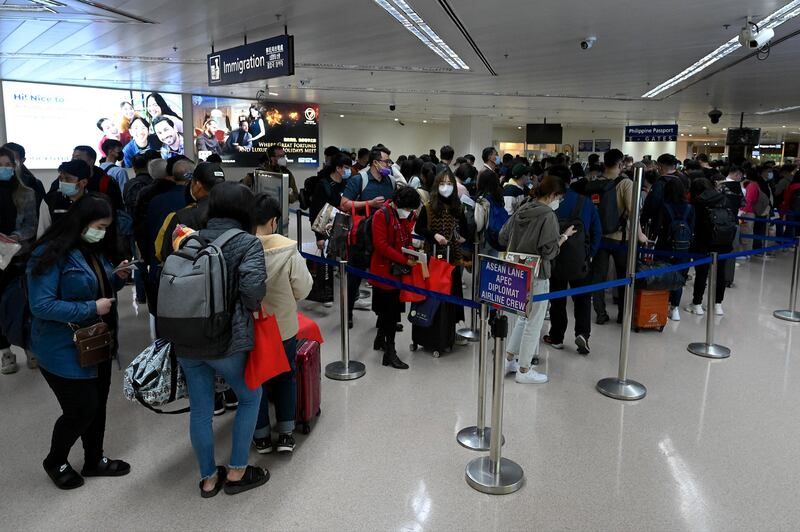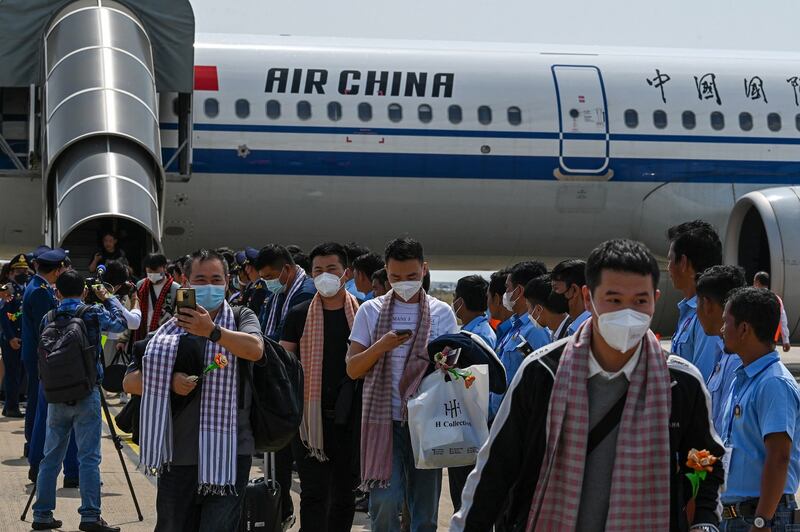Chinese police are calling up people who have booked flights to leave the country and interrogating them about where they are going and when they plan to be back, sources in the country tell Radio Free Asia.
A passenger who recently left China who gave only the surname Su said people she knows are all reporting the same phenomenon.
"If you are due to get on a plane [leaving China], you will get a call from the local police station the day before, asking in great detail where you are going and when you are coming back," Su said.
"I inquired among my friends today, and they said they had all gotten calls from police stations where their household registration is, and asking them when they're coming back," she said.
"If you don't pick up the phone ... they won't let you go through immigration the next day."
The anecdotal reports come as police across China are cracking down on telephone and forced labor scams in Cambodia and other southeast Asian countries, according to the official Minsheng Tianxia account on NetEase.
Police in the central province of Hubei announced on Feb. 7 that non-emergency and non-essential travel to Cambodia, Myanmar, Laos, United Arab Emirates, Philippines, Thailand, Malaysia and Turkey, among other countries, is now banned.
Anyone with an emergency reason for travel must provide detailed documentary evidence to their local police station before they can leave, according to the Minsheng Tianxia post.
Police reviewing travel plans
A Hubei resident who gave only the surname Zhang said the announcement is in line with reports he has heard, too.
"Local police stations are carrying out strict review processes for people leaving China, particularly if they're going to Thailand, Cambodia or other Southeast Asian countries," Zhang said.
"Right now, the airlines transmit your details to your local police station as soon as you buy your ticket," he said.

A post to the social media platform Douyin appeared to corroborate the reports.
"Official news is that going abroad is going to get harder in 2023," the post said. "This is due to the Telecommunications Fraud Law which took effect from Dec. 1. The law clearly stipulates [which departments] are responsible for managing overseas travel."
The post predicted that government departments “will probably allow the neighborhood committees to count whether residents can have passports or not, or even make them turn them in," the post said. "That would be the 'unified management of the documents' mentioned in the [law]."
More power to grassroots level
Chinese police stations have long held the power to prevent overseas travel, but the new rules appear to have devolved such decisions to a more local level, following new rules granting law enforcement powers to "grassroots" government agencies from July 2021.
Bans on nonessential travel also featured heavily during the stringent lockdowns, mass quarantines and compulsory testing of the zero-COVID policy, which ended in early December following nationwide protests.
In May 2022, reports emerged on social media that border police in the southern city of Guangzhou were questioning arriving Chinese citizens about their overseas activities and confiscating or clipping their passports, invalidating them.
Social media reports last month said the Exit-Entry Bureaus across China have now transferred the power to control overseas travel to community committees and police stations, with travelers required to gather 15 items of documentary evidence including labor contracts, return tickets and a commitment not to participate in overseas scams.
Group tours, which have packed itineraries and fairly constant supervision of members on overseas trips, appeared to be going ahead in the wake of the lifting of COVID-related travel bans, however.

The Ministry of Culture and Tourism announced on Jan. 20 that it was resuming group tours overseas "on a pilot basis" from Feb. 6, defining package tours as the purchase of "air ticket plus hotel."
Approved destinations for group tours include Thailand, Indonesia, Cambodia, Maldives, Sri Lanka, Philippines, Malaysia, Singapore, Laos, UAE, Egypt, Kenya, South Africa, Russia, Switzerland, Hungary, New Zealand, Fiji, Cuba and Argentina.
Tour companies are required to "sign travel contracts with tourists in accordance with the law, clarify the rights and responsibilities of all parties, and properly handle travel-related disputes in a timely manner," the ministry said in a directive on its website.
"Travel agencies and online travel companies are not allowed to carry out any outbound group travel and ‘air ticket + hotel’ business in violation of the schedule or beyond the scope of the [permitted] country list," it said.
They must also avoid activities that violate Chinese "laws, regulations and social morality" and are responsible for maintaining an "orderly tourism sector," the ministry warned.
Translated by Luisetta Mudie. Edited by Malcolm Foster.
